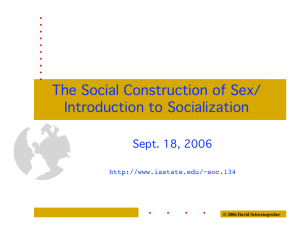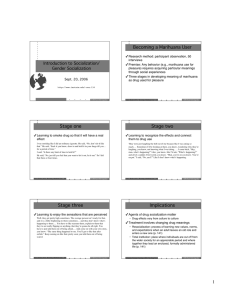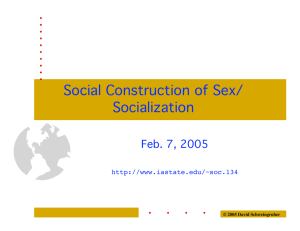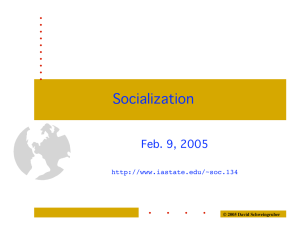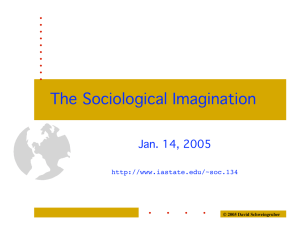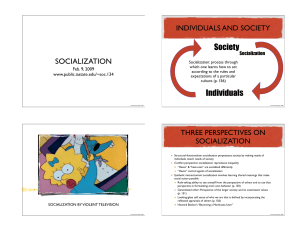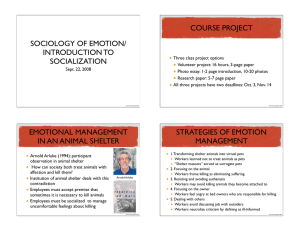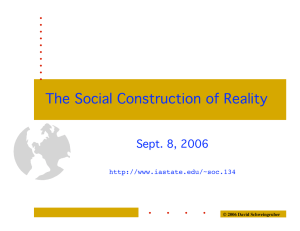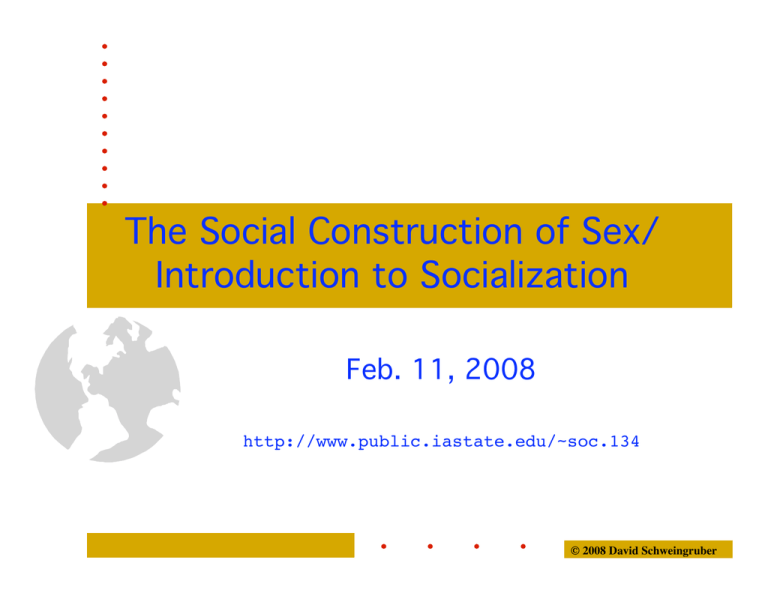
The Social Construction of Sex/
Introduction to Socialization
Feb. 11, 2008
http://www.public.iastate.edu/~soc.134
© 2008 David Schweingruber
Sex vs. gender
Sex: biological maleness or femaleness
Gender: psychological, social, and cultural aspects of maleness and
femaleness
A central part of our gender ideology is the sexual dichotomy
• Sexual dichotomy: Belief that two biological sex categories, male and
female, are permanent, universal, exhaustive, and mutually exclusive (p.
128)
Recently, sociologists have been questioning the taken-for-grantedness
of the categories “man” and “woman”
• Do the two sexes belong to the physical world or the world of meaning?
Three important pieces of evidence:
• Cross-cultural variation
• Transsexuals: People who identify with a different sex and sometimes
undergo hormone treatment and surgery to change their sex (p. 128)
• Intersexuals: Individuals in whom sexual differentiation is either incomplete
or ambiguous (p. 128)
©©2008
2000David
DavidSchweingruber
Schweingruber
Social construction of sex
Our belief in two sexes is not universal (pp. 117, 128-9)
A brief history of the sexes in Western culture
Pre-18th Century: One sex (females are inferior version)
18th Century: two sexes
1960s: Surgical assigning sex becomes norm (“culture demands it”)
1990s: Hermaphrodite liberation movement (ISNA)
Intersexuals illustrate constructedness of two-sex model
Cheryl Case illustrates how sex (not just gender) is a social construct
But case of Bruce/Brenda/David Reimer points to important role for
biology
©©2008
2000David
DavidSchweingruber
Schweingruber
People as consequence of society
Process through
which one learns how
to act according to the
rules and expectations
of a particular culture
(p. 135)
©©2008
2000David
DavidSchweingruber
Schweingruber
Three perspectives on socialization
Structural-functionalism: socialization perpetuates society by making
needs of individuals match needs of society
Conflict perspective: socialization reproduces inequality
• “Haves” & “have-nots” are socialized differently
• “Haves” control agents of socialization
Symbolic interactionism: socialization involves learning shared
meanings that make social action possible
• Role-taking: ability to see oneself from the perspective of others and to use
that perspective in formulating one’s own behavior (p. 139)
• Generalized other: Perspective of the larger society and its constituent
values (p. 139)
• Looking-glass self: sense of who we are that is defined by incorporating the
reflected appraisals of others (p. 138)
• Howard Becker’s “Becoming a Marihuana User”
Definitions: Newman’s Sociology (2000). Pine Forge Press.
©©2008
2000David
DavidSchweingruber
Schweingruber
Becoming a Marihuana User
Research method:
participant observation, 50
interviews
Premise: Any behavior (e.g.,
marihuana use for pleasure)
requires acquiring particular
meanings through social
experiences
Three stages in developing
meaning of marihuana as
drug used for pleasure
Source: Becker (1953). “Becoming a Marihuana User.” AJS.
Howard S. Becker, c. 1950 (above)
and today (below)
©©2008
2000David
DavidSchweingruber
Schweingruber
Stage one
Learning to smoke drug so that it will have a real
effect
I was smoking like I did an ordinary cigarette. He said, “No, don’t do it like
that.” He said, “Suck it you know, draw in and hold it in your lungs till you…
for a period of time.”
I said, “Is there any limit of time to hold it?”
He said, “No, just till you feel that you want to let it out, let it out.” So I did
that three or four times.
Source: Becker (1953). “Becoming a Marihuana User.” AJS.
©©2008
2000David
DavidSchweingruber
Schweingruber
Stage two
Learning to recognize the effects and connect
them to drug use
They were just laughing the hell out of me because like I was eating so
much.… Sometimes I’d be looking at them, you know, wondering why they’re
laughing, you know, not knowing what I was doing. … I come back, “Hey,
man, what’s happening?” Like, you know, like I’d ask, “What’s happening?”
and all of a sudden I feel weird, you know. “Man, you’re on you know. You’re
on pot.” I said, “No, am I?” Like I don’t know what’s happening.
Source: Becker (1953). “Becoming a Marihuana User.” AJS.
©©2008
2000David
DavidSchweingruber
Schweingruber
Stage three
Learning to enjoy the sensations that are perceived
Well, they get pretty high sometimes. The average person isn’t ready for that,
and it is a little frightening to them sometimes… and they don’t know what’s
happening to them.… You have to like reassure them, explain to them that
they’re not really flipping or anything, that they’re gonna be all right. You
have to just talk them out of being afraid.… And come on with your own story,
you know: “The same thing happened to me. You’ll get to like that after
awhile.” Keep coming on like that; pretty soon you talk them out of being
scared.
Source: Becker (1953). “Becoming a Marihuana User.” AJS.
©©2008
2000David
DavidSchweingruber
Schweingruber
Implications
Agents of drug socialization matter
• Drug effects vary from culture to culture
Treatment involves changing drug meanings
• Resocialization: process of learning new values, norms,
and expectations when an adult leaves an old role and
enters a new one (p. 141)
• Total institution: place where individuals are cut off from
the wider society for an appreciable period and where
together they lead an enclosed, formally administered
life (p. 141)
Definitions: Newman’s Sociology (2000). Pine Forge Press.
©©2008
2000David
DavidSchweingruber
Schweingruber

